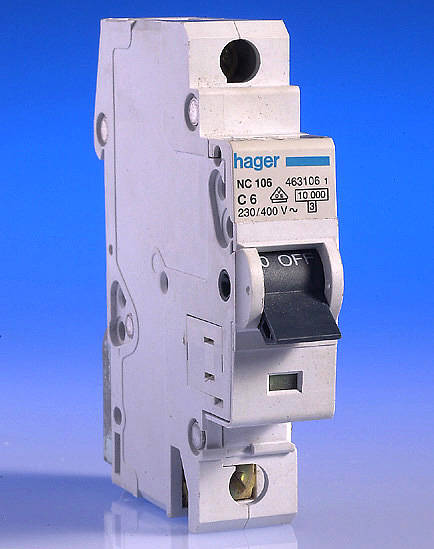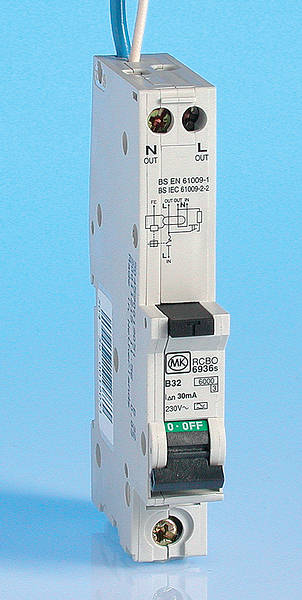We’d like to remind Forumites to please avoid political debate on the Forum.
This is to keep it a safe and useful space for MoneySaving discussions. Threads that are – or become – political in nature may be removed in line with the Forum’s rules. Thank you for your understanding.
The MSE Forum Team would like to wish you all a Merry Christmas. However, we know this time of year can be difficult for some. If you're struggling during the festive period, here's a list of organisations that might be able to help
📨 Have you signed up to the Forum's new Email Digest yet? Get a selection of trending threads sent straight to your inbox daily, weekly or monthly!
Has MSE helped you to save or reclaim money this year? Share your 2025 MoneySaving success stories!
How safe are electric showers that have not been serviced?
Comments
-
CU = consumer unit (fuse box). If there is a test button then it's a modern board with RCCB protection. Much newer than 1989.
Domestic electrical installations do not require 'servicing', An install from 1989 may be perfectly safe, even though it doesn't necessarily meet the current regs-they are not retrospective.No free lunch, and no free laptop 0
0 -
current regs only apply to any new work.
The shower is perfectly safe - what is broken is part of the outer cover, and the unit shouldnt be sealed at the bottom anyway, as that eliminates any buildup of water behind the case. There is water in the shower case just as their is outside it (like the water feed).
If the inner case where the electric bits are is broken thats another issue, but it doesnt sound like it is.
An RCD will have a press to test button, but wont be on the shower circuit anyway, its for the mains ring (ie the power sockets) primarily. The shower could be connected but its very rare.
its not great that the landlord didnt replace the shower when the broken bit couldnt be sourced, anbd I would push him on that, but its perfectly safe. The plumnber wouldnt have taped it up oif it wasnt as his kneck would be on the line if something happened. Ultimately theres not much difference between a plastic case, and plastic tape really.0 -
MCB
RCD
RCBOYou may click thanks if you found my advice useful0 -
paulmapp8306 wrote: »The shower is perfectly safe - what is broken is part of the outer cover, and the unit shouldnt be sealed at the bottom anyway, as that eliminates any buildup of water behind the case. There is water in the shower case just as their is outside it (like the water feed).
If the inner case where the electric bits are is broken thats another issue, but it doesnt sound like it is.
but its perfectly safe. The plumnber wouldnt have taped it up oif it wasnt as his kneck would be on the line if something happened. Ultimately theres not much difference between a plastic case, and plastic tape really.
what on earth are you talking about, what you have said is complete rubbish & possibly dangerious.
there is only one case on an electric shower not an inner & outer case, there shouldn't be any water inside the case, not much difference between a water sealed plastic case & plastic tape please give me a break. OP if the case is damaged & water can get inside then either the case should be replaced or a new shower fitted.I'm only here while I wait for Corrie to start.
You get no BS from me & if I think you are wrong I WILL tell you.0 -
southcoastrgi wrote: »what on earth are you talking about, what you have said is complete rubbish & possibly dangerious.
there is only one case on an electric shower not an inner & outer case, there shouldn't be any water inside the case, not much difference between a water sealed plastic case & plastic tape please give me a break. OP if the case is damaged & water can get inside then either the case should be replaced or a new shower fitted.
The break in the casing is at the base. Water cannot drip upwards. Unless someone takes the showerhead and directs it up at the base of the unit, there's little or no chance of spillage directly onto the electrical connections inside the shower, since these, for safety reasons, are always at the top of the unit, above the water inlet and outlet.
The poster you quoted didn't mean there's water sloshing around inside the casing, read his post again....
there's a water inlet to the unit, there's a water outlet, therefore.... There's water inside the case.... Geddit?0 -
The break in the casing is at the base. Water cannot drip upwards. Unless someone takes the showerhead and directs it up at the base of the unit, there's little or no chance of spillage directly onto the electrical connections inside the shower, since these, for safety reasons, are always at the top of the unit, above the water inlet and outlet.
The poster you quoted didn't mean there's water sloshing around inside the casing, read his post again....
there's a water inlet to the unit, there's a water outlet, therefore.... There's water inside the case.... Geddit?
not another one, i have read his post & how do you know what he meant ? there is still a chance that water will get into a broken case & for your information the incoming electrical connections aren't aways at the top of the case, yes of course there is water within a shower but funny enough this water is contained within a copper or plastic pipe, how do you know how the OP directs their shower & water, cases are sealed for a reason or they wouldn't have a bottom to the case at all Geddit !!I'm only here while I wait for Corrie to start.
You get no BS from me & if I think you are wrong I WILL tell you.0 -
CU = consumer unit (fuse box). If there is a test button then it's a modern board with RCCB protection. Much newer than 1989.
Domestic electrical installations do not require 'servicing', An install from 1989 may be perfectly safe, even though it doesn't necessarily meet the current regs-they are not retrospective.
Thank you, there is a line of on/off fuse things which says below 'RCCB protected', then to the right theres a line of red on/off fuse's which I think are the lights and stuff, I know one is for an outside light, and it says below 'NOT RCCB protected'. There is no RCD switch. Does this mean it's really dangerous to use the shower?
Thanks again for your help and thank you to everyone that has replied your advice is much appreciated. 0
and thank you to everyone that has replied your advice is much appreciated. 0 -
No it doesn't, subject to the water ingress issue. RCD/RCCB protection is a very good idea, but is not required by the regs.
You can tell which is the shower circuit by turning them off in succession and seeing when the shower ceases to operate. It should be on it's own dedicated circuit, not wired to a 30A ring mains.No free lunch, and no free laptop 0
0 -
southcoastrgi wrote: »not another one, i have read his post & how do you know what he meant ?
You posted on what you thought he meant, why shouldn't I?
how do you know how the OP directs their shower & water, cases are sealed for a reason or they wouldn't have a bottom to the case at all Geddit !!
Yeah, I goddit. The instructions for electric showers mostly/typically advise not to site the shower head where it is directed toward the shower unit, and mostly/typically advise not to manually direct the water onto it.0 -
For god's sake stop making things worse for the lady!
She has already said that she suffers from anxiety so people start speculating on things that are probably irrelevant and only causing further worry.
Find out the state of it without worrying her and if there is no danger then a little reassurance would be the best remedy.
A picture of the part which has been taped, if you can do that, would help us know more. If no wires or metal parts inside the shower are visible or can be touched then you are almost certain to be safe.
Showers are generally very safe, my parent's shower was well over 10 years old and never a problem and so is the one in my current property, although it does need to be replaced with a newer higher powered model.0
This discussion has been closed.
Confirm your email address to Create Threads and Reply

Categories
- All Categories
- 352.9K Banking & Borrowing
- 253.9K Reduce Debt & Boost Income
- 454.7K Spending & Discounts
- 246K Work, Benefits & Business
- 602.1K Mortgages, Homes & Bills
- 177.8K Life & Family
- 259.9K Travel & Transport
- 1.5M Hobbies & Leisure
- 16K Discuss & Feedback
- 37.7K Read-Only Boards





